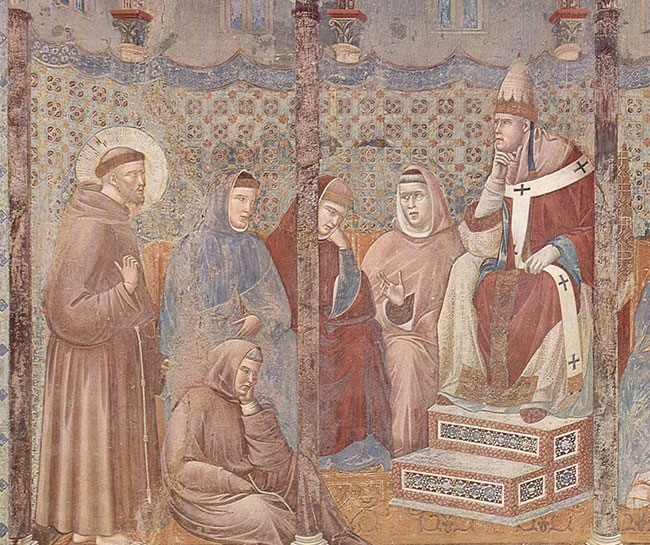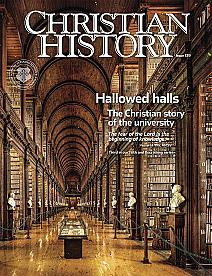WAS POPE HONORIUS III THE GREAT PACIFICATOR OR THE GREAT MILITANT?

[Above: Giotto, Fresco cycle on the life of St. Francis of Assisi: The Sermon of St. Francis Before Pope Honorius III. (detail) The Yorck Project (2002) / public domain, Wikimedia.]
POPE HONORIUS III approved three new orders, all of them influential in church history. These were the Dominicans (1216), the Franciscans (1223), and the Carmelites (1226). Had he done nothing more than that in his eleven years in the papacy, he still would be one of the most notable popes.
But he did much more. Consecrated pope on this day 24, July 1216, Cencio Savelli had served as treasurer of the Holy See since 1188 and was well-versed in all papal matters. He is considered one of the ablest administrators in the history of the papacy. While he was still chamberlain, he compiled a list of revenues and contracts that provide historians with understanding of the papacy of that era.
Honorius is sometimes called “The Great Pacificator.” A tactful man, he settled disputes and kept peace between many Catholic rivals and European factions. One notable intervention assured Henry III’s succession to the English throne during the Barons’ War that followed King John’s death. Another diplomatic overture convinced Count Heinrich of Schwerin to release King Valdemar of Denmark, whom he had imprisoned.
However, Honorius could also have been called “The Great Militarist” because he sponsored a crusade against the Moors in Spain, ordered a Crusade to retake the Holy Land from the Muslims, and bade King Louis VIII to engage in a crusade against the heretical Albigenses of southern France. He also commanded Prussia’s neighbors to crusade against that region because of its persistent paganism.
The great conflict of Honorius’s papacy, however, was with his former pupil, Holy Roman Emperor Frederick II. Frederick’s struggles to maintain his throne led him repeatedly to postpone fulfilling a vow to crusade against the Muslims who held the Holy Land. After Frederick restored Honorius following one of the pope’s flights from Rome, the pope reluctantly crowned him emperor. However, an exasperated Honorius eventually had to motivate Frederick to move against Jerusalem by threatening him with excommunication.
No stranger to scholarly pursuits, Honorius wrote biographies of the popes Celestine III and Gregory VII. He compiled his own decretals into an early collection of canon law. He also wrote a book on demonology, the Grimoire, which led to spurious Medieval knock-offs in his name. He gave privileges to the rising schools of Bologna and Paris, which thereafter became two of the earliest and greatest Christian universities.
Honorius won the love of poor Romans when he supplied grain to them during a famine. He also made the sensible ruling that Christians could eat meat on Christmas Day when the joyous celebration fell on a Friday or Saturday. He canonized several saints. Honorius died in 1227.
—Dan Graves
----- ----- -----
Read more on the University of Paris in Christian History #139, Hallowed Halls






